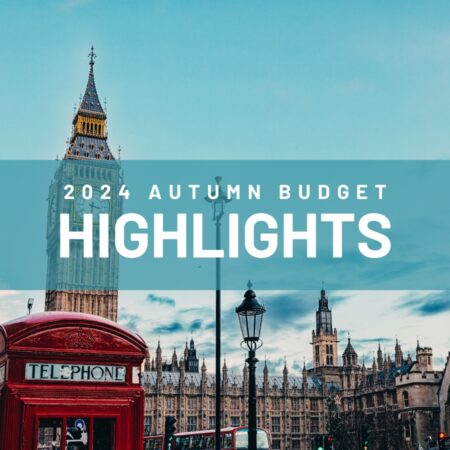Rachel Reeves delivered her first Budget as Chancellor of the Exchequer on 30 October 2024. The Autumn Budget 2024 aims to deal with the £22 billion ‘black hole’ in public finances whilst restoring stability and rebuilding public services. She announced tax rises worth £40 billion to fund the NHS and other public services.
Personal Tax
Income Tax and National Insurance (NI)
The Income Tax and employee National Insurance thresholds are currently frozen until 2028. From April 2028, they will rise annually in line with inflation.
The government will increase the Lower Earnings Limit and the Small Profits Threshold for National Insurance contributions (NICs) by 1.7% for the 2025/26 tax year, raising them to £6,500 and £6,845 per annum respectively. Additionally, for individuals contributing voluntarily, the Class 2 and Class 3 NIC rates will also rise by 1.7%. The new Class 2 rate will be £3.50 per week, while the Class 3 rate will be £17.75 per week.
Non-Domiciled Individuals
The government confirmed that the non-domicile regime will be abolished from 6 April 2025. Individuals who are eligible opt-in to the new residence-based regime will not pay UK tax on foreign income and gains for the first four years of tax residence. As part of the transition, the Temporary Repatriation Facility will be extended to three years.
High Income Child Benefit Charge
The government will not proceed with the reform to base the High Income Child Benefit Charge on household incomes as proposed by the previous government.
Capital Taxes
Capital Gains Tax (CGT)
The lower rate of CGT will be increased from 10% to 18% and the higher rate from 20% to 24% for disposals of non-residential assets made on or after 30 October 2024. The rates on residential property will remain at 18% and 24%.
For assets eligible for Business Asset Disposal Relief and Investors’ Relief, the CGT rate will increase to from 10% to 14% from 6 April 2025 and to 18% from 6 April 2026.
Carried Interest – The CGT on carried interest will also increase to 32% from April 2025 and from April 2026 it will be fully taxed under the Income Tax framework.
Inheritance Tax
The Nil Rate Band and Residence Nil Rate Band for Inheritance Tax (IHT) are currently frozen at £325,000 and £175,000 respectively until April 2028. The government is extending these threshold freezes for a further two years to April 2030.
The government will bring unused pension funds and death benefits payable from a pension into a person’s estate for inheritance tax purposes from 6 April 2027.
Agricultural Property Relief (APR) and Business Property Relief (BPR) will be reformed. From April 2026, the first £1 million of combined eligible agricultural and business assets attract 100% relief. The rate of relief on excess assets will be 50%. Additionally, the BPR rate for shares ‘not listed’ on recognised stock exchanges (e.g., AIM) will be reduced to 50%.
Employment
National Insurance Contributions (NICs)
- Employer NICs – From 6 April 2025, the rate of employer NICs will increase from 13.8% to 15%. The per‑employee threshold at which employers start to pay NICs will be reduced from £9,100 to £5,000 per year.
- Employment Allowance – The Employment Allowance currently allows businesses with employer NICs bills of £100,000 or less in the previous tax year to deduct £5,000 from their employer NICs bill. The amount of the Employment Allowance will be increased from £5,000 to £10,500 and the £100,000 threshold for eligibility will be removed.
National Living and Minimum Wages
From April 2025, the National Living Wage for employees aged 21 and over will rise by 6.7% to £12.21 per hour. Additionally, the National Minimum Wage for 18-20-year-olds will increase to £10.00 per hour for all eligible workers.
Cars and Vehicles
The government is setting Company Car Tax (CCT) rates for 2028/29 and 2029/30 as follows:
- Increase of 2% per year for zero emission and electric vehicles.
- Increase to 18% in 2028/29 and 19% in 2029/30 for cars with emissions of 1-50g of CO2 per kilometre.
- Increase of 1% per year for all other vehicle bands.
- The maximum will also increase to 38% in 2028/29 and 39% in 2029/30.
The government will uprate the Van Benefit Charge and Car and Van Fuel Benefit Charges by CPI from 6 April 2025.
Other Announcements
Umbrella Companies – Starting in April 2026 to tackle widespread tax avoidance and fraud in the umbrella company sector, recruitment agencies will be required to handle Pay As You Earn (PAYE) for payments made to workers supplied through umbrella companies. If no recruitment agency is involved, this responsibility will fall to the end client business.
Apprenticeship Levy – The Government announced a £40 million investment to transform the Apprenticeship Levy into a more flexible Growth and Skills Levy.
Business
First Year Allowances – The government will extend the 100% First Year Allowances (FYA) for qualifying expenditures on zero-emission cars and electric vehicle charge points by one additional year. This extension will apply until 31 March 2026, for Corporation Tax purposes and until 5 April 2026, for Income Tax purposes.
Corporate Tax Roadmap – The government has published a Corporate Tax Roadmap. The Roadmap includes a commitment to cap the Corporation Tax Rate at 25%, maintain the Small Profits Rate and marginal relief at current rates and thresholds and maintain key features such as Full Expensing, the Annual Investment Allowance, R&D relief rates and the Patent Box.
Retail, Hospitality, and Leisure Properties – For the 2025/26 tax year, eligible retail, hospitality and leisure (RHL) properties in England will receive a 40% reduction in their business rates liability, replacing the existing 75% relief. This relief will be capped at a maximum discount of £110,000. Additionally, the small business multiplier will remain frozen for 2025/26.
Starting from 2026/27, the government will implement permanently lower multipliers for RHL properties, offset by a higher multiplier for properties with Rateable Values exceeding £500,000.
Energy Profits Levy – The rate of the Energy Profits Levy will be increased by 3% to 38% from 1 November 2024. The levy will continue to apply until 31 March 2030.
Other Announcements Included:
Stamp Duty Land Tax – The higher rates of Stamp Duty Land Tax for purchases of additional dwellings will be increased from 3% to 5% from 31 October 2024.
Private Education
- VAT – From 1 January 2025, private school fees including boarding services will be subject to 20% VAT.
- Business rates – Starting from April 2025, private schools in England will no longer receive business rates relief as new legislation will eliminate their eligibility for charitable rate relief.
HMRC Late Payment Charges – From 6 April 2025, the government will increase the late payment interest rate charged by HMRC on unpaid tax liabilities by 1.5%.
Bus Fares – £2 cap on single bus fares in England to rise to £3 from January, outside London and Greater Manchester.
More Information
For further details and additional announcements from the Budget, please visit our in-depth PDF:
Alternatively, view our summary brochure here:
Need help? Get in touch
If you would like more detailed, one-to-one advice on any of the issues raised in the Chancellor’s Budget speech, please do get in touch with our team. Call us on 01904 655202, or email enquiries@hghyork.co.uk
 My HGH
My HGH



 My HGH
My HGH









